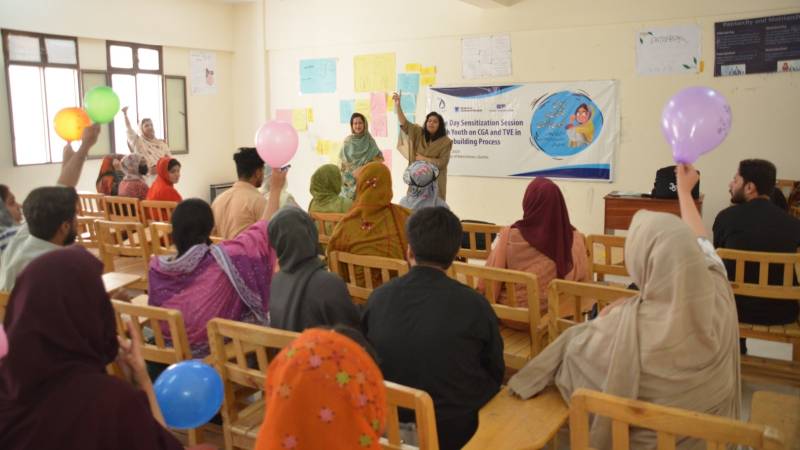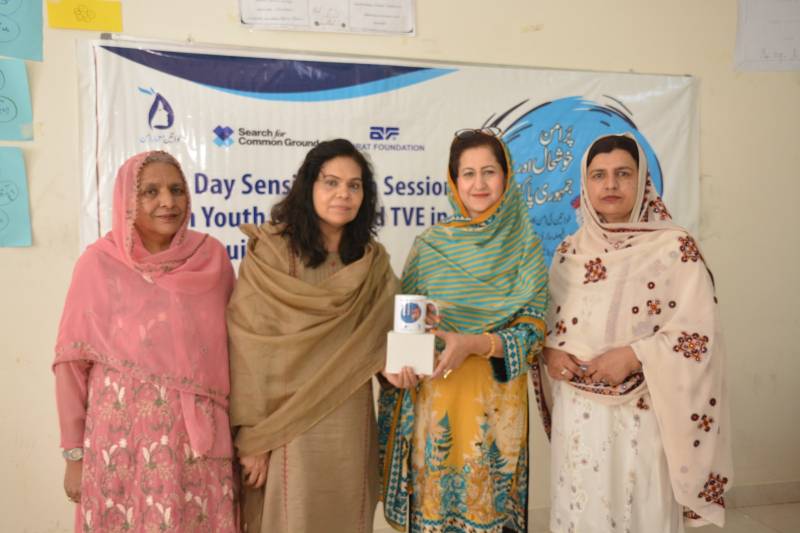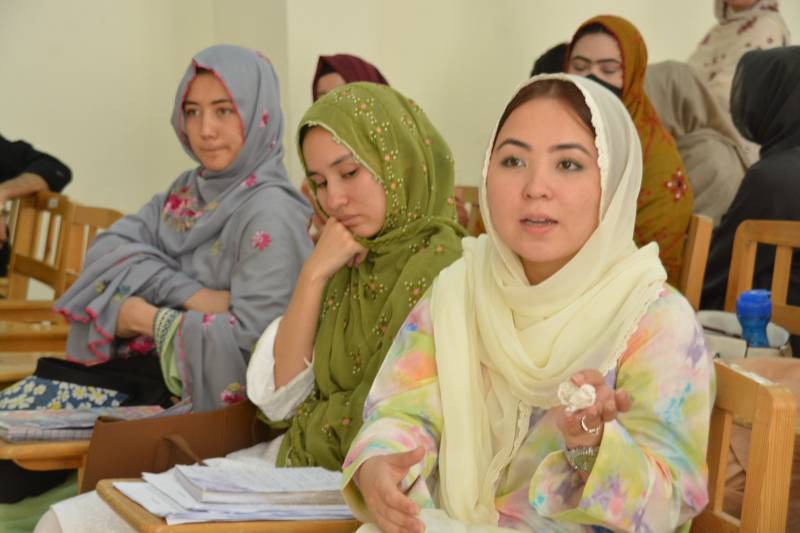
Educational institutions should remain open for gender-inclusive education, activities, curricula, trainings, and mentoring to nurture the creative thinking, worldviews, and practical approaches of society. This will lead to a gender-sensitised community where individuals respect each other without discrimination, stereotypes, or taboos. This perspective emerged from debates during an Aurat Foundation-supported activity at the Department of Gender Development Studies, University of Balochistan (UoB).
“The session was thoroughly interactive, involving activities and participant engagement rather than just traditional lectures,” explained Sitara Hazara, 25, a BS Gender Development Studies student at UoB, Quetta. “Providing an environment for participants to engage in games, role play, and storytelling helps develop confidence in students and removes obstacles created by gendered mentalities.”

She shared that the activities at the Gender Department provided practical examples of how individual actions, whether positive or negative, impact society. “The way a person sees himself reflects in society and can lead to either construction or destruction, especially in a conflict-ridden place like Balochistan where peacebuilding and role models are essential,” Sitara added.
Despite having one of the largest networks of schools, colleges, and universities, the province still lacks a gender-equal environment. The young generation needs to be equipped with wisdom, knowledge, culture, and understanding, which are crucial for societal progress.
Founded in 1986 in Lahore under the society’s registration act of 1860, Aurat Foundation began as Aurat Publication and Information Service Foundation. It originated from the Women Action Forum movement to be the voice for voiceless women across Pakistan, transcending class, ethnicity, regional, and religious differences. From a two-room women's resource centre, it has grown into a national women's rights organisation with a presence in all Pakistani districts. It is committed to creating a just, democratic, and caring society where women and men are recognised as equals, living with self-respect and dignity.
The founders, Nigar Ahmed and her friend Shahla Zia, began their work on the streets, and their first project was Information Network Centres (INC). Currently, with support from the Government of Pakistan's gender policies, Aurat Foundation, in collaboration with Search for Common Ground, is implementing a project called ‘SHE – The Peacebuilder.’ This project focuses on building the capacity of 75 Women Peace Architects (WPAs) to effectively participate in the peacebuilding process and collaborate with government and civil society stakeholders.
The main theme was engagement with students using a common ground approach to peacebuilding and countering violence and extremism
Aurat Foundation, in collaboration with Women Peace Architects, plans to organise peace-promoting activities across various societal segments. Recently, Aurat Foundation architects Saira Iqbal, Pashmina Khilji, and Yasmeen Mughal organised a one-day session at the University of Balochistan's Gender Studies Department. Students from Media Studies, Gender Development Studies, and Sardar Bahadur Khan Women University (SBK, Quetta) participated.

The main theme of the session was engagement with students using a common ground approach to peacebuilding and countering violence and extremism. This is particularly relevant in Balochistan, with its history of conflict, militancy, and hate speech. The first session involved forming groups of five, with each member introducing another, fostering interaction and breaking gender barriers.
In the second session, students received coloured cards and drew five-petaled flowers, writing something about themselves in each petal. One male student wrote, “human, Muslim, Baloch, student, and kind,” while a female student described herself as, “student, tutor, independent, responsible, good learner, honest, and aggressive.” These self-descriptions reflect individual roles in society and family, illustrating how qualities like kindness and responsibility influence societal peace, explained Yasmeen Mughal, a peacebuilding expert from Aurat Foundation.
The third session involved a practical activity, "blowing balloons." Each participant was given a balloon to keep intact, but they soon started bursting each other’s balloons, leading to few winners. This exercise demonstrated how greed and selfishness disrupt balance and cooperation, highlighting the importance of respecting equality for societal peace and happiness.
The practical session had a significant impact on the students. "The session was truly remarkable. I learned about the rights of women and their social and political roles in peacebuilding. Additionally, I learned how violations at the individual level can disrupt societal peace," said Maryam Aman, a Media Studies student.
The Gender Development Studies Department is a key area where inclusivity studies are pursued. Gender awareness and upliftment play a critical role in the development and peacebuilding of society. "No society in the world is democratic, developed, peaceful, and diverse without maintaining equality," stated Dr Shahida Habib Alizai, chairperson of Gender Development Studies, UoB, Quetta.
"We gained a lot from the session. Without inclusivity and diversity based on gender equality, we cannot progress. Such activities enlighten students and youngsters in Quetta, preparing them as future leaders who can convey messages, knowledge, and skills to promote a gender-inclusive society," said Hamna Amjad from Sardar Bahadur Khan Women University.
Inclusive activities are essential in societies where patriarchal constructs prevail. Without a change in mindset, no society can progress, resulting in backwardness. "We need such activities to deconstruct gender biases," said Hassan Jutt, 22, a Media Studies student at UoB, Quetta.
Though the students were awarded certificates and refreshments, they felt enriched by the inclusive activity organised by the Aurat Foundation. This organisation is one of the leading advocates for gender equality in Balochistan, a society where tribal, religious, sectarian, and patriarchal constructs dominate wisdom, culture, and history, all of which need to be reconstructed in a more inclusive, democratic, and diverse way.

